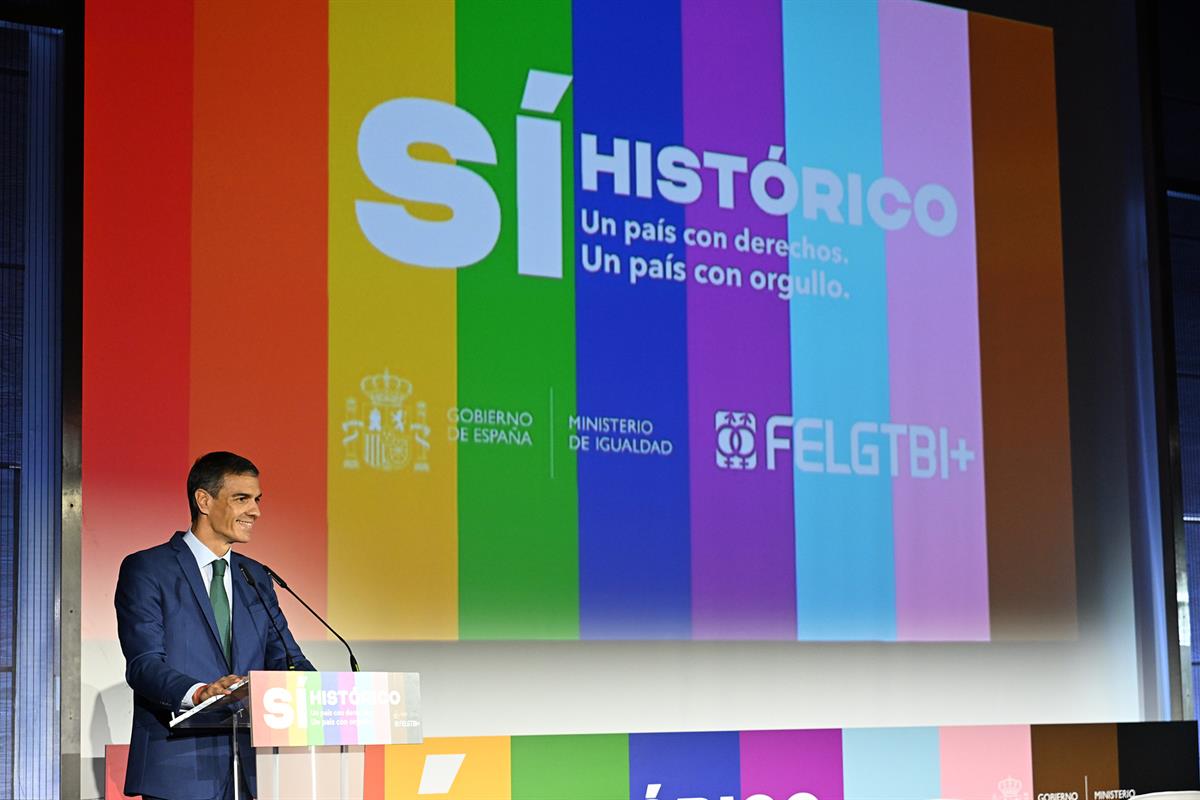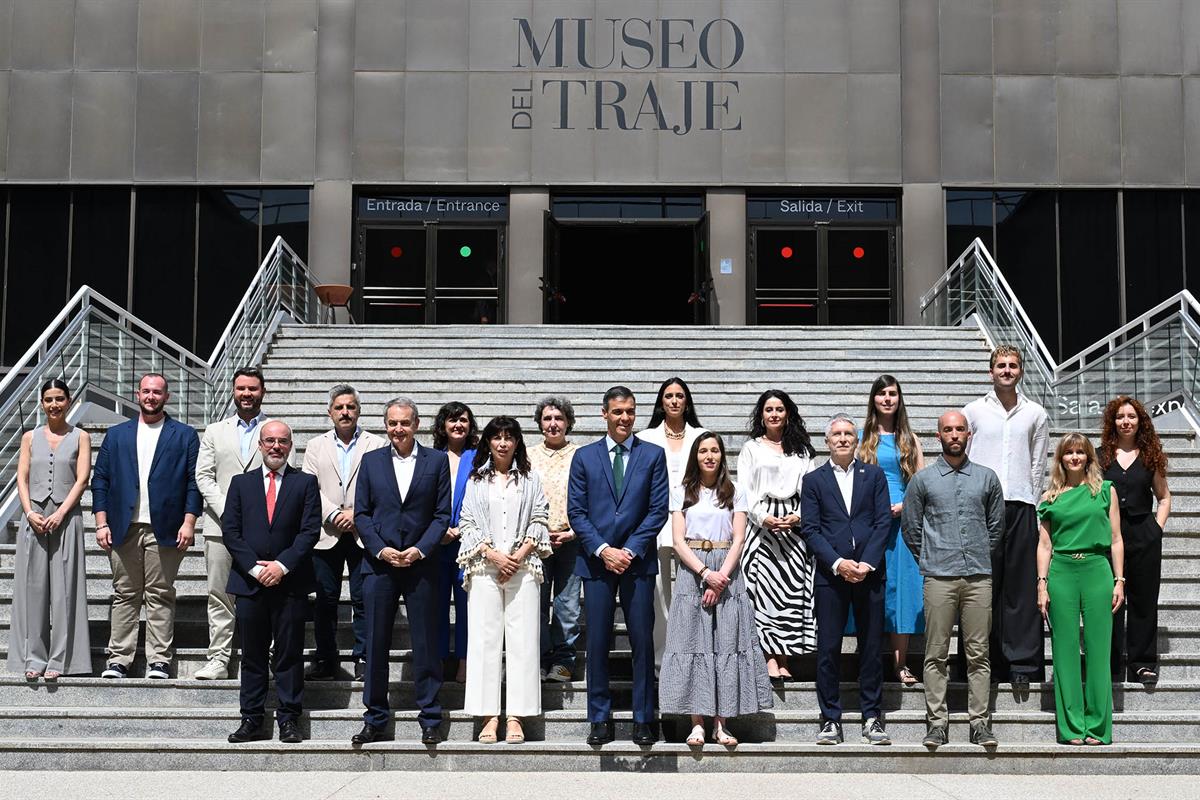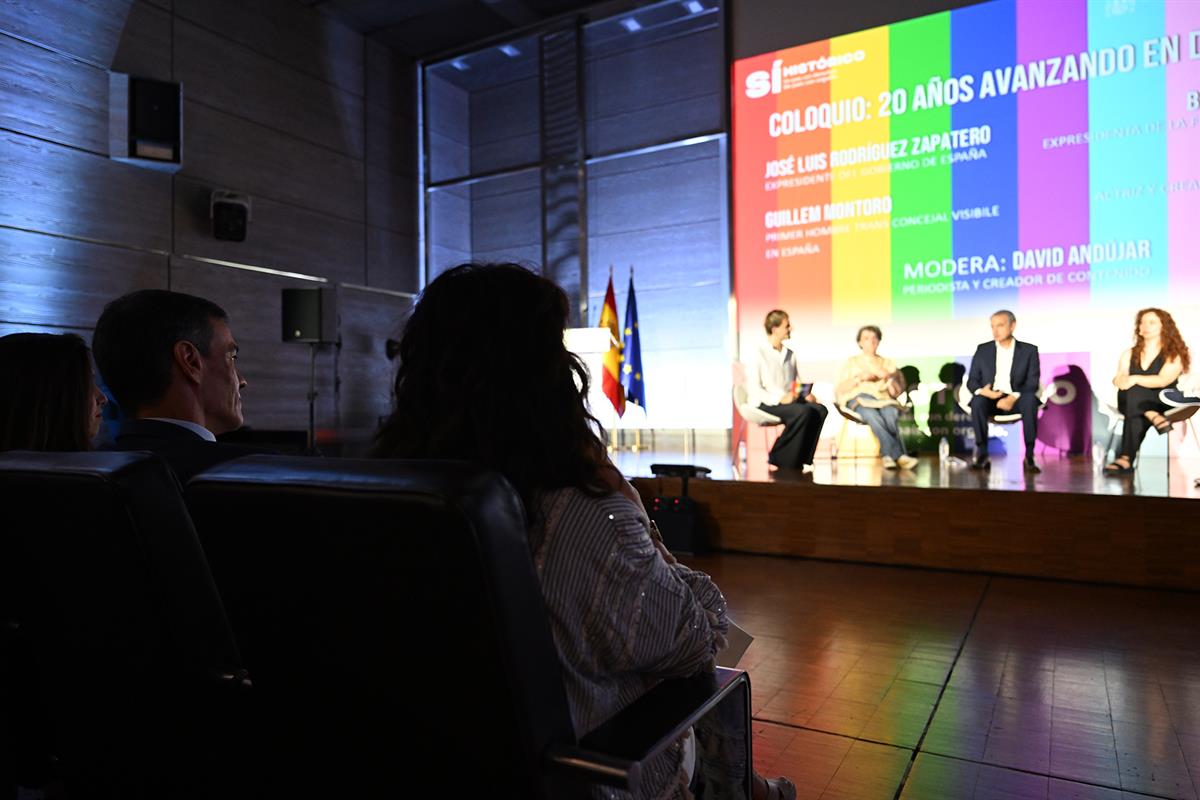Pedro Sánchez praises the historic achievement of equal marriage, which is a source of "pride, memory and gratitude"
President's News - 2025.6.23
Costume Museum, Madrid
 The President of the Government of Spain, Pedro Sánchez, during his speech at the event nn the occasion of the twentieth anniversary of the approval of equal marriage in Spain (Pool Moncloa / Borja Puig de la Bellacasa)
The President of the Government of Spain, Pedro Sánchez, during his speech at the event nn the occasion of the twentieth anniversary of the approval of equal marriage in Spain (Pool Moncloa / Borja Puig de la Bellacasa)
On the occasion of the twentieth anniversary of the approval of equal marriage in Spain, the President of the Government of Spain, Pedro Sánchez, took part in an event "of pride, memory and gratitude" for this "freedom that was won 20 years ago". "A freedom that is not empty of content" two decades later and that "marks a whole life".
Sánchez recalled that it was on 30 June 2005 that "Spain became a freer" and "fairer" country. "That day won the freedom to say 'I do' without anyone telling you that you can't". "To be free not to ask forgiveness for who one is, nor permission to do what one wants" and, consequently, "to look at and inhabit the world without fear".
The head of the Executive pointed out that this 20th anniversary is, first and foremost, an act of pride, "because it was not easy at the time". Spain, he explained, was the third country in the world to approve equal marriage, after the Netherlands and Belgium, and the first to recognise the right to adoption for these couples.
"In a world that at the time looked at us with scepticism, even scandal, we were brave" and "Spanish society accompanied us", although "not as a whole", said Sánchez, recalling the demonstrations against the change. "At that time we would have been called 'woke' if that term existed then. Instead, they called us a threat, an aberration, a historical mistake... they accused us of breaking up the family. But today, twenty years later, we can look at the past and say that nothing was broken. On the contrary: we build on realities, we broaden the meaning of families, in the plural.
Memory and gratitude
Pedro Sánchez also stated that this was an act of "memory" in which "we remember that rights do not fall from the sky: they are conquered", and that they always "arrive on time for some and late for others".
 Group photo of the event on the occasion of the twentieth anniversary of the approval of equal marriage in Spain | Pool Moncloa / Borja Puig de la Bellacasa
Group photo of the event on the occasion of the twentieth anniversary of the approval of equal marriage in Spain | Pool Moncloa / Borja Puig de la Bellacasa
On this point, he stressed that, since 2005, more than eight million people have been born in Spain, and that "for them, the idea that two men or two women can marry or form a family is absolutely normal, and that is extraordinary; and it vindicates the transformative and progressive power of politics". But at the same time, there were couples who were never able to get married, who suffered insults, beatings, incomprehension..., "and for this reason," he insisted, "today we must vindicate the memory".
Finally, Sánchez had "words of thanks" for "those who pushed for the law to be changed", such as activists, associations, groups, families and also public officials. "Today," he said, "we cannot remember this achievement without mentioning the person who gave it a face, a heart and a lot of eloquent words, Pedro Zerolo, and also, logically, President José Luis Rodríguez Zapatero". He also thanked "the courageous vote of the parliamentary groups that made this majority possible: PSOE, Izquierda Unida, Esquerra Republicana, PNV, Coalición Canaria, two MP from Convergencia and one MP from PP".
After reviewing some of his Government's achievements in terms of equality and defence of LGBTI rights, such as the so-called Zerolo anti-discrimination law, the transgender law or the tabling - by his group - of a bill to bring conversion therapies into the Penal Code, President Sánchez wanted to send a message to all LGBTI people to tell them that "what they try to erase from you, today we are going to protect by law" and "what they tried to erase, this country embraces, recognises and celebrates." He also said that, although we live in a better Spain, we are not a perfect country, because "a perfect country would not suffer and would not mourn the murder of Samuel Luiz."
Appeals to diplomacy, dialogue and multilateralism
During his speech, and in reference to the current international context, Sánchez pointed out that "our world is increasingly hostile, more warlike, more prone to conflict and confrontation, more susceptible to succumbing to the siren songs of wars that never bring anything good"; in which "there are never winners, but rather we are all losers", and he asked "where has our commitment to peace gone, why do we resign ourselves to renouncing the word to resolve conflicts? Today I want to vindicate diplomacy, dialogue and multilateralism as the best way for our peoples to live together on a planet we share."
"To these discourses of war and hatred we say that they can do a lot of damage, as they are doing, but they will not win. Not while we have a voice and a memory. "Because rights are not carved in stone either, but this country has already chosen to move forward, and we will not allow it to be returned to the wardrobe, to silence or to fear," he added.
 The President of the Government of Spain, Pedro Sánchez, and the Minister for Equality, Ana Redondo, during the discussion "Advancing Rights" | Pool Moncloa / Borja Puig de la Bellacasa
The President of the Government of Spain, Pedro Sánchez, and the Minister for Equality, Ana Redondo, during the discussion "Advancing Rights" | Pool Moncloa / Borja Puig de la Bellacasa
The president concluded by affirming that this 'Pride' we vindicate all that we have yet to conquer here, as well as those who cannot raise their voices in their countries. "Spain is not Hungary, but the streets of Madrid will be the streets of Budapest." "Spain is your home, because here we have learned that freedom is not a destination, it is a daily commitment." He added: Let them hear it well, both inside and outside: here we do not go backwards, here we move forward and always look ahead. Here we live with pride; pride in the country and pride in its people."
The event, organised by the LGBTI+ State Federation and the Ministry of Equality, also included speeches by the Minister Ana Redondo, and former President José Luis Rodríguez Zapatero. It was also attended by the Minister for Home Affairs, Fernando Grande-Marlaska.
Non official translation




